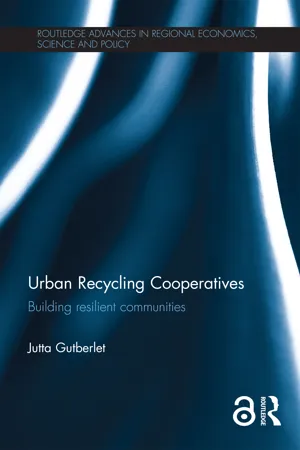
- 176 pages
- English
- ePUB (mobile friendly)
- Available on iOS & Android
About This Book
Solid waste is a major urban challenge worldwide and decisions over which technologies or methods to apply can have beneficial or detrimental long-term consequences. Inappropriate management of solid waste can lead to damaging environmental impacts, particularly in the megacities of the Global South.
Urban Recycling Cooperatives
explores the multiple narratives and interdisciplinary nature of waste studies, drawing attention to the pressing social, economic and environmental challenges related to waste management. The book asks questions such as: how do we define waste and our relation to it; who is involved in dealing with waste; and what power interactions become manifest over issues of accessing and managing waste? In recent years informal cooperatives have emerged, devoted to recycling household and business waste before reclassifying it and redirecting it to the authorities. Hence, these workers are able to reclaim significant amounts of natural resources and thus contribute to the saving of resources and lessened waste management expenditures.
With particular reference to the Brazilian megalopolis of São Paulo, this book describes this paradigm shift in the general understanding of waste as unwanted discard towards the recognition of waste as a resource that must be recovered for reuse or recycling. It would be of interest to students and policy makers working in international development and waste management.
The Open Access version of this book, available at http://www.taylorfrancis.com, has been made available under a Creative Commons Attribution-Non Commercial-No Derivatives (CC-BY-NC-ND) 4.0 license.
Frequently asked questions
Table of contents
- Cover
- Half Title
- Title Page
- Copyright Page
- Dedication
- Table of Contents
- List of photographs
- List of figures
- List of tables
- List of boxes
- Acknowledgements
- 1 Waste governance: an introduction
- 2 Situated theoretical framework for waste governance
- 3 Participatory community-based research: theory and praxis
- 4 From hazardous ‘informal’ recycling to decent working conditions
- 5 The social aspects of waste
- 6 Health and risk factors for waste pickers
- 7 Recycling the organic fraction of household waste
- 8 Contributions to climate change mitigation: environmental benefits from the work of waste pickers
- 9 Different ways of managing waste: from neoliberal to cooperative approaches
- 10 Final outlook: a world without waste
- References
- Index